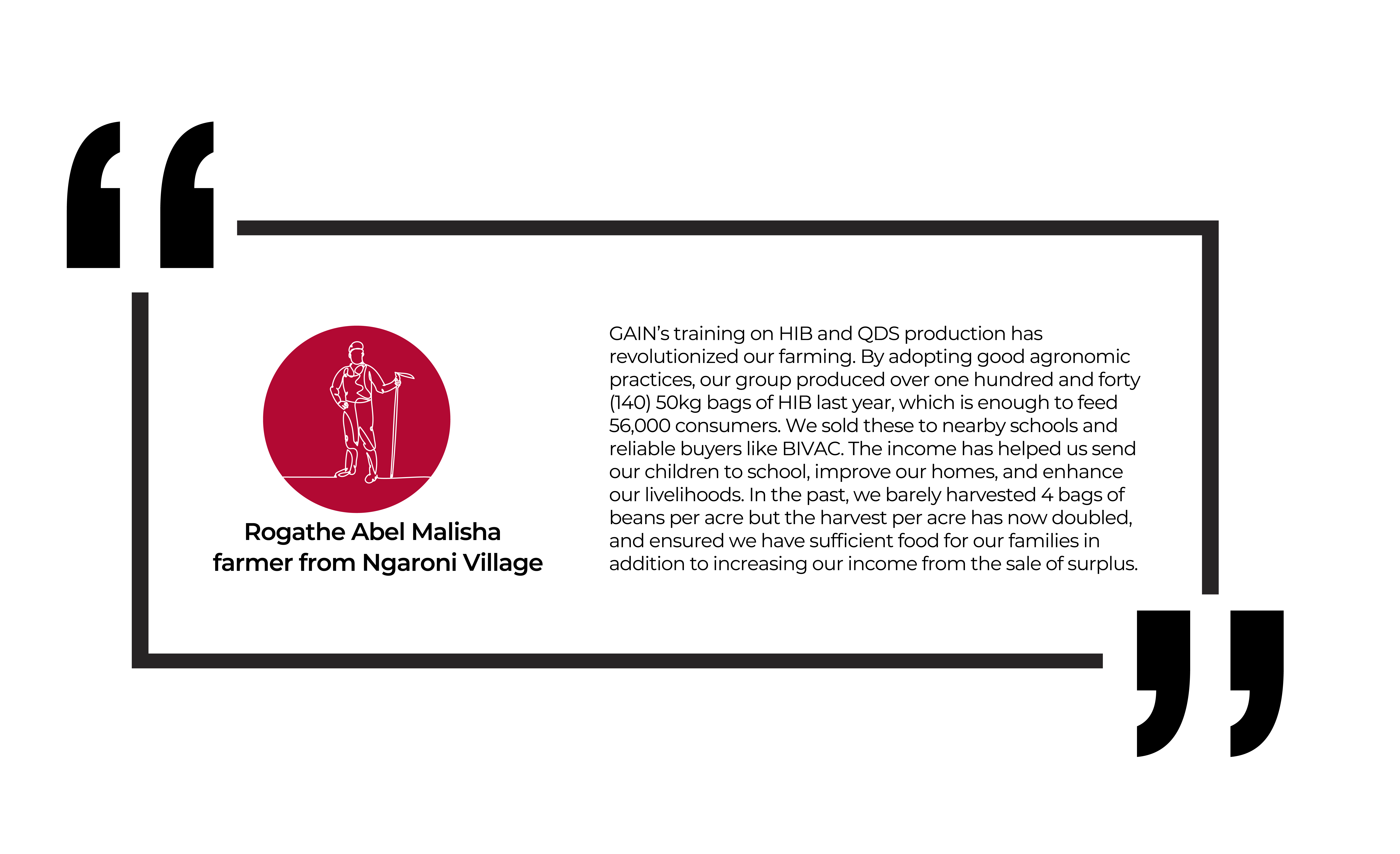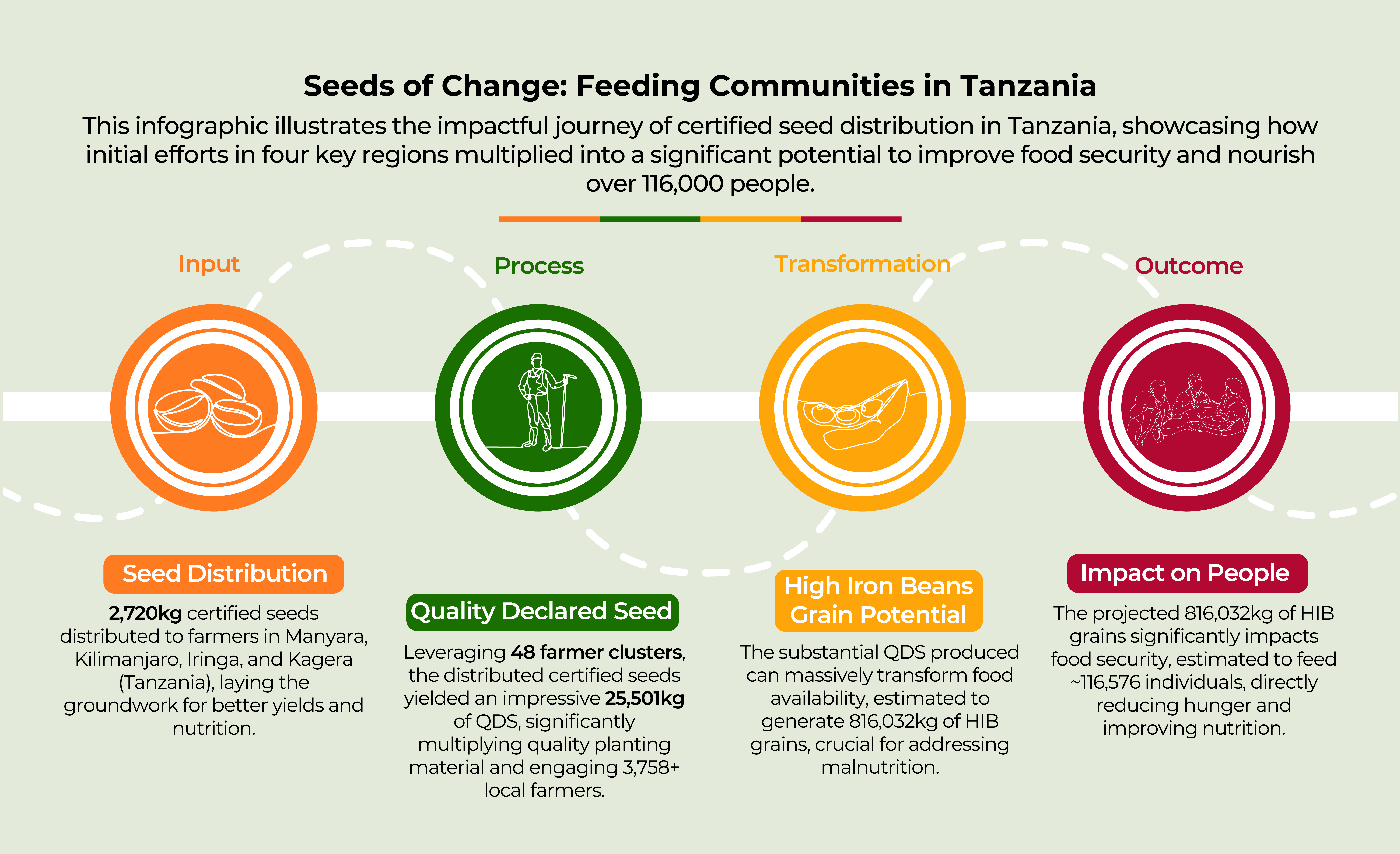In Tanzania, 85- 90% of the land is cultivated by smallholder farmers majority of whom face challenges in getting access to quality seeds and assured markets for their produce, thus limiting their capabilities to produce quality produce and generate steady income. Currently, 57% of pregnant women in Tanzania are anemic. Additionally, according to the Tanzania Demographic and Health Survey 2015 (TDHS), 58% of children under the age of 5 years in the country were anemic.
High iron beans (HIB), promoted by GAIN, have the potential to combat iron deficiency. Iron deficiency or anemia, caused by insufficient intake of iron, continues to affect a large portion of the population. GAIN is working to promote HIB production and consumption across multiple regions in Tanzania as part of broader efforts to improve food and nutrition security in the country through nutrient enriched crops.
One of the key constraints to HIB adoption is seed availability. Farmers may not have easy access to quality seeds, or they may not be able to afford them. With support from the Ministry of Foreign Affairs in the Netherlands, GAIN provided farmers in all programmatic regions with locally produced certified HIB foundation seeds- free of charge, on a contractual basis. Certified seeds are high-quality, approved seeds that have been tested to ensure they grow well, are disease-free, and produce a good harvest. Farmers, selected as champions for HIB, were then trained to produce Quality Declared Seeds (QDS), a portion of which they sell back to GAIN at market price. The QDS purchased by GAIN were then redistributed to additional farmers. QDS is a farmer-led seed production system in Tanzania that improves access to affordable, high-quality seeds. This model has greatly transformed the lives in the community in various ways.a
For Rogathe Abel Malisha, a farmer in Levishi Ward, life has completely changed since adopting HIB and QDS. "Before GAIN’s training, we barely harvested four bags of beans per acre,” she shares. "But now, using QDS and better farming techniques, our group produced over seven tons of HIB last year. The income has helped us send our children to school, improve our homes, and secure food for our families."
Farmers like Rogathe are at the heart of GAIN’s efforts to empower communities through better agricultural practices and market access. Across Tanzania, thousands of smallholder farmers now see farming not just as a necessity but as a reliable source of income and improved nutrition for their families.
A Holistic Solution: The HIB Project
The promotion of HIB QDS production among farmer clusters is a key driver for sustainability in the HIB value chain. GAIN’s HIB project is establishing a sustainable seed supply chain by enabling local farmer clusters to produce and sell QDS within their communities. Partnering with seed producers and the Tanzania Official Seed Certification Institute (TOSCI), GAIN is supporting the training of these farmer clusters to become certified QDS producers, creating a new pathway for income while supporting local seed and grain production. This growing network of certified seed producers will be able to sell to schools and farmers for grain production,
ensuring that HIB reaches more people in the programme regions and beyond. Sufficiency and affordability of quality seed, alongside other efforts by GAIN in creating sustainable market linkages for HIB, has motivated farmers to produce more, fostering a robust ecosystem of production, demand, and income generation. Ultimately, the efforts will result in improved nutrition status among the most vulnerable in the targeted communities.
Highlights/Success/Key Outcomes
Promoting good agricultural practices
Quality Declared Seed (QDS) producers are championing sustainable farming by utilizing community demo plots to showcase best practices and the benefits of quality seeds. By growing QDS during the off-season using community-based irrigation systems, farmers can observe firsthand the seeds’ performance, including factors like germination rate, seedling vigor, purity, growth rate, pest and disease resistance, flowering, pod development, drought tolerance, and yield. The benefits of QDS extend beyond seed quantity and quality. This hands-on demonstration enables the community to learn and appreciate the value of adhering to Good Agricultural Practices (GAP). As a result, local interest and demand for high-quality seeds are stimulated, creating a stronger market for the producers. This approach inspires more community members to adopt GAP to meet the growing demand for high-quality seeds.
Empowered Farmers through HIB QDS Production and Scaling up Market Linkages
GAIN is building the capacity of farmer clusters in Kilimanjaro, to QDS become certified producers through targeted training and partnerships. Tanzania Official Seed Certification Institute (TOSCI)-certified farmers now produce and sell HIB within their communities, schools, and nearby markets, boosting both income and household food security. As QDS production scales, GAIN continues with parallel efforts to strengthen market linkages—connecting farmers with schools, suppliers, and food processors to meet the growing demand for HIB. In Siha district, 38 farmers have been trained and certified by TOSCI, further expanding the initiative.
Judith Andrea William, an Agriculture Officer in Siha District, highlights the impact: “GAIN’s collaboration has empowered farmers with QDS training and certification, enhancing their capacity to produce seed quality, strengthening community partnerships, and improving nutrition among school going children. In addition, the initiative is boosting farmer incomes and leaving a lasting impact on food security.”
Talking further about the impact made on the lives of the people, we spoke to Rogathe Abel Malisha, who is a farmer from Levishi Ward in Ngaroni Village.

Between 2022-24, 2,720kg of certified seeds were distributed to farmers in the Manyara, Kilimanjaro, Iringa and Kagera regions of Tanzania. This yielded 25,501kg of QDS from 48 farmer clusters, with at least 3,758 farmers registered under the clusters. The 25,501kg of QDS was estimated to produce 816,032kg of HIB grains, enough to feed 116,576 people.

Connecting Schools and Farmers for Improved Nutrition
One of the major outcomes of QDS production has been that it has enabled bridging the supply gap in schools that have included HIB in school meals. The direct connection between farmers and school suppliers establishes a reliable market for both the HIB producers and the schools and ensures continuous consumption of HIB among school children as a way of increasing their iron intake. Presently, over 8 school suppliers have been linked to farmers to offtake their produce. As more schools in the implementation regions adopt HIB in their school meals, the demand for QDS will continue to grow, and possibly result in spillage in the neighboring regions and schools. As of 2024, the project had directly reached over 33,500 students across 61 schools in the project regions, with some schools producing HIB on their school farms. Two hundred and eighty-five more schools are expected to be engaged for the 2024-2025 cropping seasons in Iringa region, with an expected reach of over 228,000 students. The mechanism employed by GAIN to connect farmers to suppliers and to educational institutions fosters a nutrition-driven value chain with lasting benefits for communities.
Looking Ahead
The integration of HIB QDS into Tanzania’s agricultural value chain is transforming the livelihoods of smallholder farmers by creating the HIB seed pipeline within the community, while improving nutrition in schools and communities. As the project continues to scale, GAIN remains committed to expanding the QDS model across Tanzania, aiming to onboard more farmers, foster partnerships, and provide the solutions for affordable nutrient-rich beans to more schools and communities. By empowering farmers to be certified QDS seed producers and growing a network of market off-takers including schools, GAIN is paving the way for a sustainable value chain that tackles food and nutrition insecurity and supports economic growth for vulnerable communities in Tanzania.
References
[1] https://pmc.ncbi.nlm.nih.gov/articles/PMC8268339/